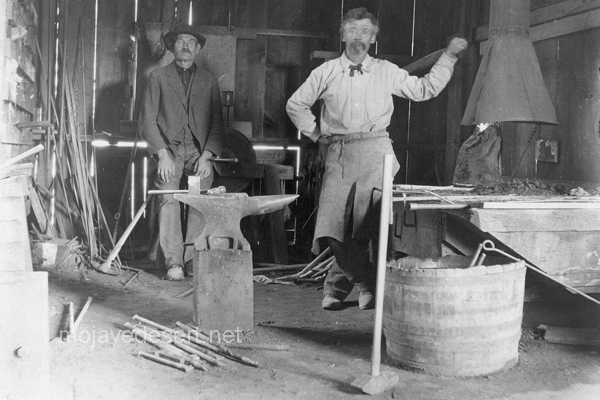Alf's Blacksmith Shop
Alf's Blacksmith Shop: A Legacy Forged in the DesertIn the dusty heart of the Mojave Desert sits one of Daggett’s quiet treasures—a weathered old blacksmith shop that has outlasted boomtowns, freight routes, and even fire. Alf’s Blacksmith Shop, built in the 1880s by Seymour Alf, isn’t just a relic—it’s a symbol of the grit and adaptability that built the desert towns of San Bernardino County.
v2.jpg)
Seymour Alf wasn’t born a blacksmith. He arrived in the area in 1881 and first tried his hand at farming near Point of Rocks, now Helendale. But the desert isn’t known for being kind to farmers, and before long, Seymour shifted to freighting and raising cattle, supplying meat and supplies to miners in the area. By 1885, he had settled in Daggett, where the mining boom along the Mojave River was creating a steady demand for strong wagons, reliable repairs, and skilled craftsmanship. So, he did what desert pioneers often do—he adapted.
He opened a blacksmith shop on 1st Street, and it quickly became one of the busiest spots in town. Alf’s shop didn’t just shoe horses or fix wagon wheels. It became famous for something bigger: building the legendary twenty-mule team borax wagons. These behemoths of the trail were used to haul tons of borax from the sweltering flats of Death Valley all the way to the railheads in Mojave. They had to be strong, precise, and dependable—and that’s exactly what Seymour delivered.
After a fire in 1894 burned the original structure, Seymour rebuilt the shop and continued turning out borax wagons to the same demanding specifications. The work was hard and the desert unforgiving, but the business kept going. In time, Seymour's son Walter took the reins, running the shop until his own passing in 1970.
Though the mines quieted and the wagons gave way to trucks and roads, the shop remained. While other blacksmith shops in Daggett converted into garages to keep up with the automobile age, Alf’s stayed true to its roots. The building still stands today—weathered but proud, a rare survivor from an era when metal and muscle kept the desert moving.

The Alf family's contributions didn’t stop at wagons. Seymour also helped with road construction and grading in the early years of what would eventually become Route 66. He and his descendants played a key role in shaping how people and goods moved through the high desert long before pavement marked the way.
In 2025, thanks to the dedicated efforts of Seymour Alf’s great-great-granddaughter, Caitlin Hibma, the shop was officially added to the National Register of Historic Places. It was a fitting tribute to a family that forged more than iron—they shaped the very backbone of desert transportation.
Today, Alf’s Blacksmith Shop remains in the family and stands as a quiet monument to the resilience of those who built a life in the Mojave. It’s more than just a building—it’s a story of fire, grit, and the kind of craftsmanship that doesn’t quit.